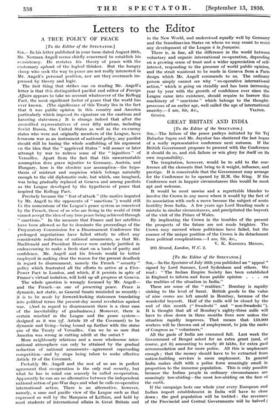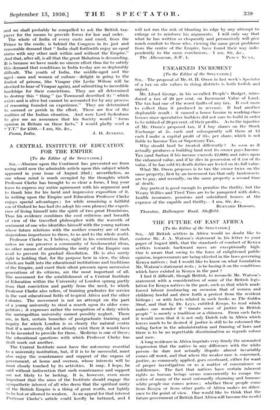[To the Editor of the SPECTATOR.] S1R,—In the Spectator of
July 28th you published an " appeal " signed by Lord Sumner, Lord Sydenham and others. We read : " The Indian Empire Society has been established
in England to inform and focus public opinion . . on the realities of the situation in India."
These are some of the " realities." Bombay is rapidly sinking to the level of Surat. British goods to the value of nine crores are left unsold in Bombay, because of the wonderful boycott. Half of the mills will be closed by the end of this month (" Swadeshi " and " non-Swadeshi "). It is thought that all of Bombay's eighty-three mills will have to close down in three months from now unless the situation rapidly improves. That means that 150,000 workers will be thrown out of employment, to join the ranks of Congress as " volunteers."
All the gaols of India are crammed full. Last week the Government of Bengal asked for an extra grant (and, of course, got it) amounting to nearly 20 lakhs, for extra gaol accommodation and for more police. All this is unpleasant enough ; that the money should have to be extracted from nation-building services is more unpleasant. In general India makes shift with a police force amazingly small in proportion to the immense population. This is only possible because the Indian people in ordinary circumstances are amazingly law-abiding—the most law-abiding on the face of the earth.
If the campaign lasts one whole year every European and Indian import establishment in India will have to close down ; the gaol population will be trebled : the revenues of the Provincial and Central Governments will be halved ;
and we shall probably be compelled to ask the British tax- payer for the means to provide forces for -law and order.
The whole of India of every caste and creed, from the Prince to the coolie, is behind the Congress in its just and reasonable demand that " India shall forthwith enjoy an equal status with any other unit within and without the Empire." And that, after all, is all that the great Mahatma is demanding. It is because we have made no sincere effort thus far to satisfy this demand that conditions in India to-day are so deplorably difficult. The youth of India, the middle-aged and the aged—men and women of culture—delight in going to the foulest of prisons, like Visapur (Sir Leslie Wilson will be shocked to hear of Visapur again), and submitting to incredible hardships for their convictions. They are all determined to destroy this " thing " (as Townsend described it) " which exists and is alive but cannot be accounted for by any process of reasoning founded on experience." They arc determined to succeed or perish in the effort. These are few of the realities of the Indian situation. And were Lord Sydenham to give me an assurance that his Society would " focus opinion in Britain on these facts," I would gladly send u T.T." for £500.-1 am, Sir, &e.,
Poona, India. J. D. JENKINS.











































 Previous page
Previous page